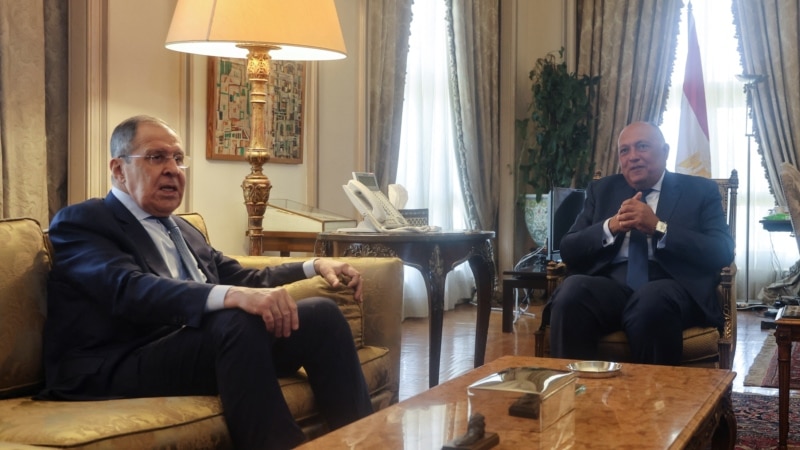Russian Foreign Minister Sergey Lavrov met with Egyptian President Abdel Fattah el-Sissi and Foreign Minister Sameh Shukri in Cairo Sunday for talks focusing on efforts to end the Ukraine crisis, moves to resume grain exports from Russia and Ukraine, joint trade agreements, regional conflicts and a nuclear power plant which Russia has begun to build on Egypt’s north coast.
The first leg of Lavrov’s Africa visit, Cairo, centered on major issues facing Russia and Egypt, on both the economic and political fronts. Both countries do between $4 and $5 billion in annual trade and the Ukraine conflict and COVID-19 have caused disruptions to tourism, grain sales and energy exports.
Lavrov and Shukri indicated in a joint press conference Sunday that both sides were working to overcome issues of mutual concern:
Shukri said that the Ukraine conflict has affected Egypt’s food security, its energy needs, its trade with the outside world and created inflation and supply chain issues that need to be resolved.
Shukri went on to say that Egypt “would like to see a diplomatic solution to the Ukraine conflict based on common sense and dialogue,” and “ending military hostilities and settling political differences.”
Egyptian political sociologist Said Sadek told VOA that he thinks that visits this past week by President el-Sissi to France and Germany may have been part of an effort to mediate a diplomatic solution between Russia and Ukraine.
“I think that the visit by [el-]Sissi to Europe had to do with mediating the Ukrainian crisis, regardless of what the [cover story] may be, because if you look, he went to Germany and France. They are the ones leading Europe regarding the Ukraine crisis — after the Americans, of course — and Serbia, which is very close to the Russians.”
Lavrov, for his part, noted that he had discussed “putting a speedy end” to the Ukraine conflict with el-Sissi and all the factors involved in doing so. His comments came as Russia continues its attacks in Ukraine.
Lavrov said that Russia appreciates the speedy search for a peaceful settlement, taking into account the fundamental legitimate interests of all participants in the process, in the context of building a sustainable European security architecture on a fair basis.
Egypt’s Dabbah nuclear power plant, on which Russia recently began construction, was also reportedly a major topic of discussion between Lavrov and his hosts. Russia’s Rosatom is building the plant.
Middle East energy analyst Paul Sullivan, who is with the Washington-based Atlantic Council think tank, told VOA that “nuclear power plants give the building country, in this case Russia, 80 to 100 years of leverage in the receiving country.” He added that “Russia and China dominate the export of nuclear power plants… [which] is a great source of political, diplomatic and economic power for both countries.”
Lavrov is also expected to visit Ethiopia, where Egypt is hoping that he raises the subject of the controversial Grand Ethiopian Renaissance Dam, which Cairo worries will affect the quantity of water it receives on the Nile from the dam. Ethiopia – a nation of more than 110 million people – has said it needs the power from the dam for its development.
Gelmo Dawit contributed to this report.

